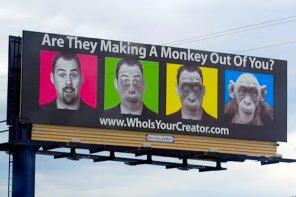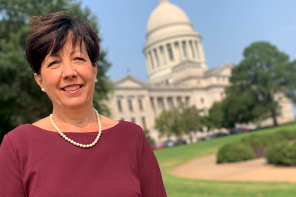What inspired you to write The Explanation for Everything?
The novel is about a biologist who discovers the possibility of faith. One major inspiration was reading about a 2004 court case, wherein a group of parents sued the school board of Dover, PA, for trying to insert intelligent design into the biology classroom. The school board wanted ninth-grade science teachers to state that intelligent design was a valid alternative to evolution, and to teach from a Creationist-leaning textbook called Of Pandas and People.
In the end, the judge shot down the school board in a strongly-written statement that publicly destroyed the idea of intelligent design as science. I was intrigued by this case and by the motives of the school board: why would they try this? What did they hope for? As a rational, evidence-based kind of person, I totally disdain how they tried to refashion a ninth-grade science curriculum; but as a novelist I found myself interested in their attempt, and in their sad plight after the judge handed down the decision.
What’s the most important take-home message for readers?
That we all believe what we need to believe to get through our lives. For some of us (many of us?) it’s that a supernatural deity is watching out for us. For others, it’s that a supernatural deity created us and gave us meaning. For others, like myself, it’s that there are evidence-based scientific explanations for everything, and it’s up to us to figure these explanations out.
Is there anything you had to leave out?
One of my favorite characters in the novel is an ardent Darwinian, a professor at Princeton who goes on at great lengths about the beauty of evolution and the way evolutionary theory can explain everything about us. Man, was he fun to write! But a blowhard is a blowhard, even when he’s fun—and eventually I had to cut many paragraphs of his disquisitions about our evolutionary heritage.
What are some of the biggest misconceptions about your topic?
There are many misconceptions about evolution, intelligent design, religion, Creationism—too many to comprehensively list. But I’ll tell you the biggest misconception about me, which is that I’m either an angry Creationist or an angry Darwinian. I’m neither. I’m a very mild-mannered Darwinian who wishes, every so often, that there could be a supernatural deity to blame when things are going poorly or thank when they’re going well.
Did you have a specific audience in mind when writing?
I’m hoping to find people who are interested in science and religion, or who just like a good story.
Are you hoping to just inform readers? Give them pleasure? Piss them off?
My only goal, when writing a novel, is to entertain people—to make them want to stay up past their bedtimes turning pages, to make them miss their subway stops. I want people to be so involved in the story that they think about it long after they’ve closed it for the last time. That’s always the goal, the only one.
What alternative title would you give the book?
I thought of several titles, but none of them worked for the publisher—I was especially fond of The Disbeliever. But I’m pretty bad at titles, and I was quite relieved when my editor stepped into the breach and came up with a good one.
How do you feel about the cover?
I think it’s beautiful! It’s a section of an old Dutch painting—an image of a snake twisted into an infinity symbol, with a bird dropping something into its mouth. It covers all the bases, thematically: we’ve got some Adam and Eve in there, and some scientific conceptualization too.
Is there a book out there you wish you had written? Which one? Why?
Tons of them! Too many even to count, but favorites include Lolita, Mr. Bridge and Mrs. Bridge by Evan S. Connell, Self Help by Lorrie Moore, and Come to Me by Amy Bloom.
What’s your next book?
It’s the first novel I’ve ever tried to write from a female perspective—it’s a mother writing her autobiography for her son. I’m really looking forward to getting back to work on it, since writing is the only part of this whole business I feel I have any control over (after all, I have absolutely no control over the reviews, the sales, the audiences or lack thereof at my readings). I miss being in charge! And, like the good grouchy writer I am, I miss being alone.



